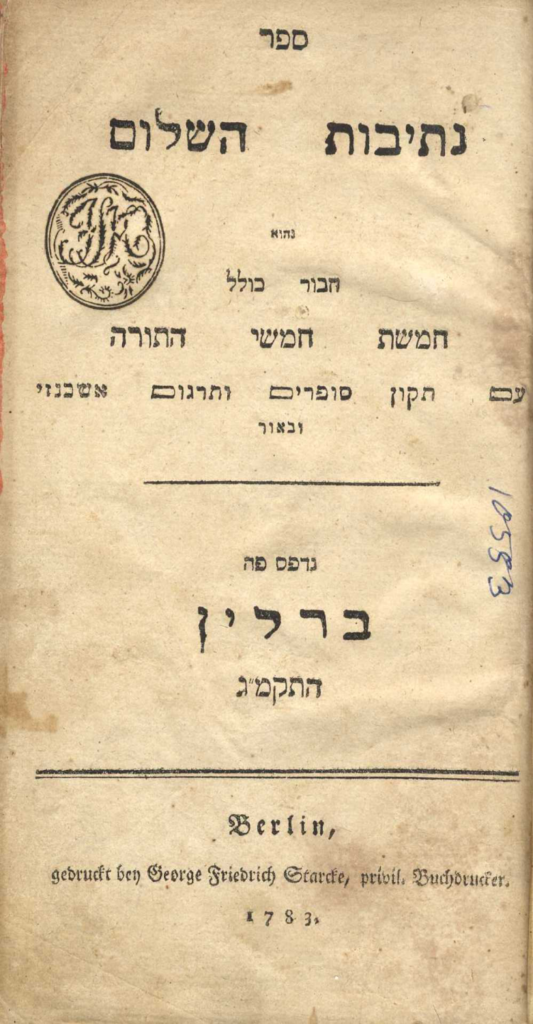
Netivot HaShalom. Genesis with Tikkun Sofrim, Targum Askenazi and “Biur” [edited by Moses Mendelssohn]. Berlin, 1783. First edition of the Pentateuch with the “Biur.”
This copy also includes the “Ohr L’Netivah,” an inclusive preface to all five books, written by Mendelssohn, explaining the development of his work. In other known copies of this work, this preface is printed after Exodus. Includes the list of signatories on the book, headed by Christian VII, King of Denmark.
Mendelssohn’s edition of the Pentateuch does not include the Targum Onkelos or Rash”i’s commentary. The verses are flanked by “Targum Ashkenazi” – a German translation of the verses, according to the simple understanding of the text, in Hebrew letters. Mendelssohn authored this “Targum Ashkenazi” himself. The “Biur” was a collaborative effort with: Shlomo Dubno, Rabbi Naftali Hertz Wessely and others.
The “Biur” was sharply attacked by G-d-fearing Jews, headed by Rabbi Rephael HaKohen of Hamburg, the author of Hafla’ah , and his disciple the Chatam Sofer [who said ‘ובספרי רמ”ד אל תשלחו יד’] loosely translated: Do not outstretch your hand to to touch Mendelssohn’s (RM”D) books]; in addition to chassidic leaders, headed by the author of Bnei Yissachar in his Maayan Ganim . In a sermon that the Hafla’ah delivered in Frankfurt, he attacked Mendelssohn: “Israel has been publicly defiled, and nobody protests. A commentary on our Torah has been written, that includes invented inanities … and in Vilna it was burnt … by those zealous for G-d …”
This copy has the first title page, without the additional Yiddish title page found in some copies. It is followed by the “Ohr L’Netivah” with a half-title and then another half-title: Sefer Bereishit and the body of the book.
[1]: [23]: [1] 299 leaves. 20.5 cm. With the “Ohr L’Netivah.” Fine condition. Minimal stains. Nice, new binding.
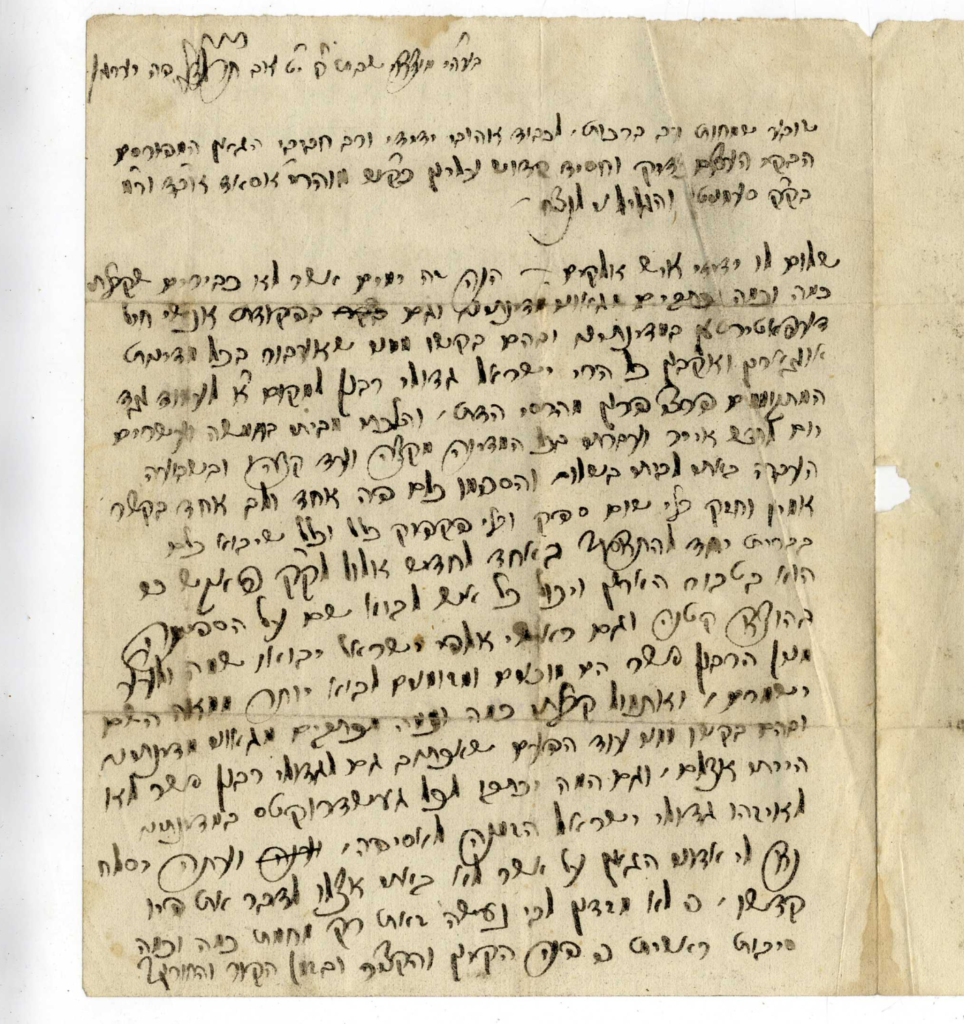
“… to stand opposing those who gathered to breach the path, destroyers of religion … in agreement, together as one mouth and one heart, with a strong and courageous bond … that everyone should gather together on the first of Elul.”
Letter of invitation sent to Rabbi Yehudah Assad regarding the meeting to be held in Paks, in the month of Elul, 1844.
A large assembly headed by Avraham Geiger took place in Braunschweig in 1844, later known as one of the first major Reform gatherings. Demands to make significant religious amendments were made at this meeting, and discussions commenced about issues such as mixed marriages (only with members of monotheistic faiths), eliminating the mussaf prayer service, the anticipation of mashiach, and the practices of shofar and lulav, and allowing organ playing in the synagogue, etc. Among the decisions taken at this meeting was the cancellation of the Kol Nidrei prayer (which was a central component of the Reform’s demands for amendment).
In response to the aforementioned assembly, Rabbi Shraga Feivel Horowitz, former rabbi of Paks (though at the time he was already appointed rabbi of Papa), called for a meeting in opposition to the Braunschweig assembly. Letters were sent to about 120 rabbis, but most of them declined due to the difficulties and expense of travel. In the end, approximately 25 rabbis gathered in Paks, including the Mahari”a Assad. At the meeting’s close they formulated a declaration against the Reform movement ( Mazkeret Paks , 110).
The Gaon Rabbi Yehudah Assad , 1764-1866, was considered the halachic authority in Hungary after the passing of the Chatam Sofer. He served as a dayan in Dunaszerdahely, and established a large yeshivah with hundreds of students. He likewise served as Av Beit Din for the cities of Regendorf, Szerdahely, and Semnitz, and corresponded extensively with the Chatam Sofer. In 1864 he took part in a rabbinic delegation to Emperor Franz Joseph, who wished to cancel the plan to establish a state rabbinic seminary.
[3] pages, ink on paper. 22×17 cm. Fine condition, stains and damage to some of the letters, fold marks.
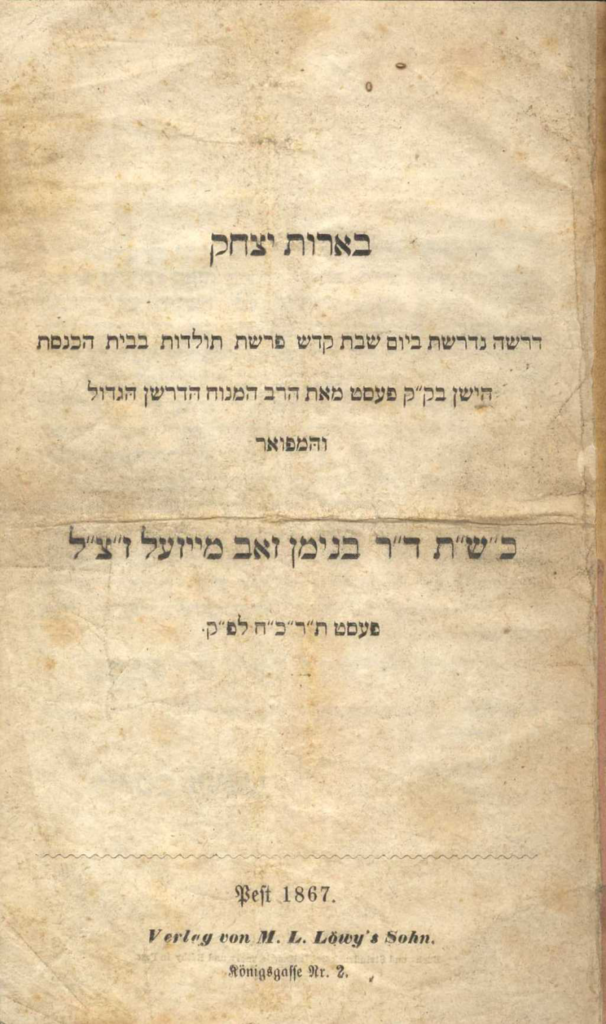
Historic sermon delivered in the old synagogue in Pest on Shabbat of the Toldot Torah portion of 1867, by Rabbi Binyamin Zeev Meisel, in a final attempt to reconcile between the Orthodox and Reform in the community, a sermon after which the rabbi collapsed and passed away. Budapest, 1867. Only edition. Rare work.
‘These are the final words spoken by the deceased, z”l, to his congregation, because after the end of this precious sermon, he suddenly fainted. During the repetition of the amidah, when the cantor said the words of kedushah ‘ברוך כבוד ה’ ממקומו’ a death-stroke entered his bones – his spirit did not return to him, and during the twilight of Shabbat’s conclusion, his soul departed in sanctity … the word “Shalom” was the final word to leave his lips before being silenced by the kiss of death. [From the introduction to the book by Shimon Bachrach.]
Rabbi Leib Schwab was selected to serve as rabbi of the Pest community in 1836. Although he studied under the Chatam Sofer and Rabbi Mordechai Benet, he strayed from the traditional path and grew close to the maskilim of the city, which brought about the wrath of his earlier teachers. The Neolog community already made certain changes in the Central Synagogue in Pest in his time. Rabbi Schwab took a compromising stance and attempted to satisfy both the conservatives and the liberals in that he was prepared for any innovation that was not explicitly forbidden by the Torah. Two years before the inauguration of the Great Synagogue in Pest, Rabbi Schwab passed away.
After Rabbi Schwab’s passing, Rabbi Binyamin Zeev Meisel was appointed as first chief rabbi of the magnificent synagogue in Pest which was inaugurated in Elul 1859 and contained approximately 3000 congregants. The central location of the synagogue in the Seventh District of Budapest provided it with a place of honor in the cityscape. However, the Neolog influence intensified in the form of attempts to bring an organ into the synagogue, to be played by a gentile on Shabbat and holidays and more, which caused the total abandonment of the congregation by the Orthodox. The historic sermon before us was the final attempt to make peace between the camps and prevent the separation of the Orthodox community from the Neolog community in the city [ We are all sons of one man, my brothers and friends, respond to your hearts and recover! Will the sword of battle forever consume! Return it to its sheath – are we not all sons of one man, Avraham …’ ] which did not succeed in the end. In effect, with Rabbi Meisel’s passing, the communities finally split and the Orthodox established a separate body on a side street with their own synagogue headed by the zealous Rabbi Chaim Sofer of Munkacs.
15, 16 pages, Hebrew and German. 18 cm. Hebrew title page and German title page. Rare. Fine condition. Minimal aging stains.
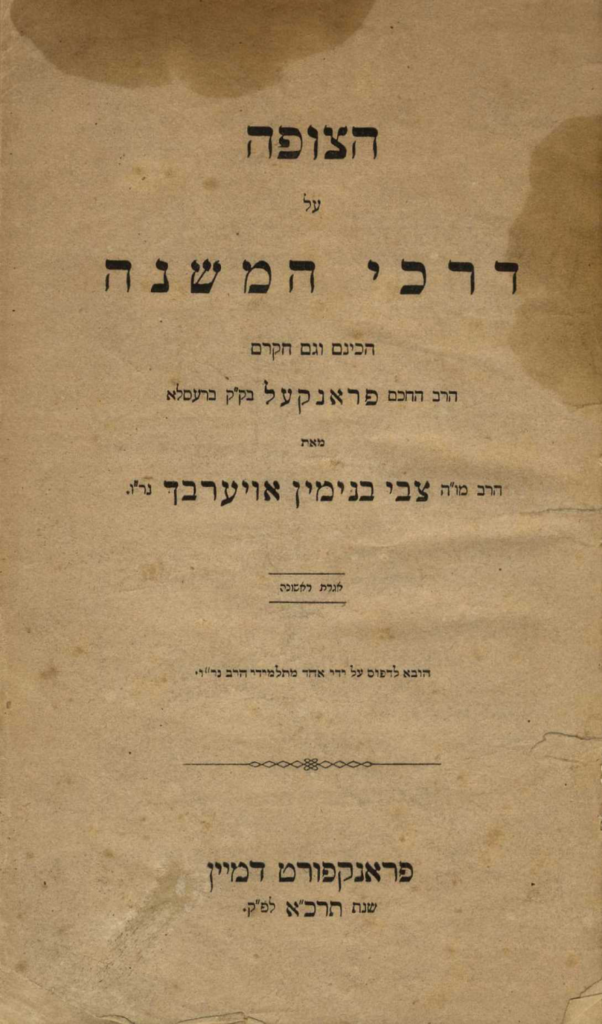
1. Kuntress HaTzofeh al Darchei HaMishnah . By Rabbi Tzvi Binyamin Auerbach, Frankfurt, 1861, [2], 54 pages. 2. Kuntress Divrei Shalom V’Emet , by Shlomo Yehudah Rapoport, inscribed by the author. Prague, 1861. [1] 35 pages. 3. Kuntress Mipnei Kishut , critique of Seder Darkei HaMishnah by Rabbi Shlomo Zeev Klein, Frankfurt, Sivan 1861, 32 pages. 4. Kuntress HaEmet V’HaShalom Ohavo , by Rabbi Shlomo Zeev Klein, Frankfurt, Av 1861, 22 pages.
In 1860, Zechariah Frankel published his work Darchei Mishnah. The book aroused great turmoil, because, despite the fact that Frankel spoke admiringly about the Tanaim as great legislators, he did not mention or even hint at the divinity of the Oral Torah at all. In addition, Frankel claims that the idea of “Torah of Moshe at Sinai” was only a later interpretation by the Tanaim themselves, indicating that these ideas are very clear – as if they were said to Moshe at Sinai. Many rabbis, including Rabbi Samson Refael Hirsch, Rabbi Ezriel Hildesheimer and Rabbi Tzvi Binyamin Auerbach (in his HaTzofeh al Darchei HaMishnah in this lot) publicly opposed the book and demanded that Frankel declare that he recognizes the divinity of the Torah. Rabbi Shlomo Zeev Klein published his Ha’Emet V’HaShalom Ahavo as an appeal to Frankel to clarify his position. Rabbi Shlomo Yehudah Rapaport (Shi”r) defended his friend Frankel with his Divrei Shalom V’Emet and wrote that Frankel would undoubtedly answer the questions and declare his belief in the Divinity of the Oral Torah. In response to Shi”r, Rabbi Shlomo Zeev Klein wrote the HaEmet V’HaShalom Ohavo, defending Rabbi Samson Refael Hirsch’s position in the episode. However, later, Shi”r himself attacked Frankel, claiming that he hadn’t adequately declared his position.
Shi”r was a member of the Haskalah in Galicia and a founder of “Chochmat Yisrael,” the movement that started the science of Judaism. He was a son-in-law of the author of the Ketzot HaChoshen and a noted Torah scholar in his own right.
Zechariah Frankel was the spiritual father of the Conservative movement. He was a rabbi in Breslau.
Rabbi Shlomo Zeev Klein was the chief rabbi of Colmar, and one of the first Orthodox rabbis to battle the Reform.
Rabbi Tzvi Binyamin Auerbach was the rabbi of Darmstadt, he is considered one of the first rabbis of the Neo-Orthodox movement.
Condition: Overall fine-very fine.
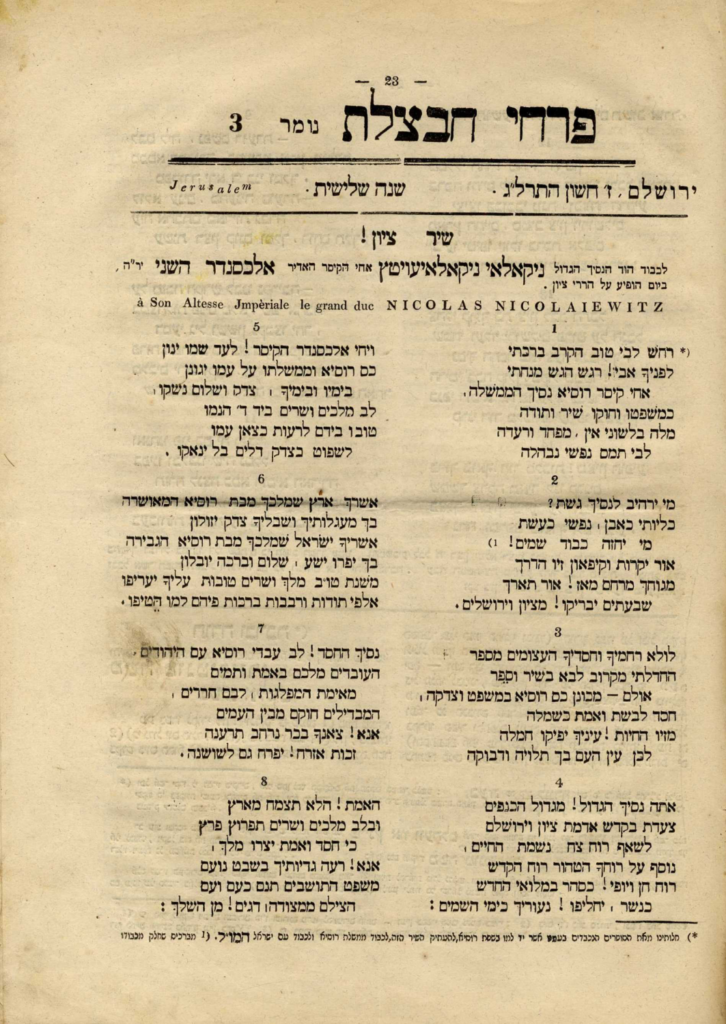
Chavatzelet, Mev aser Tziyon: Michtavei Et Yotzeh LaOhr B’Chol Shavua Yevaser V’Yashmia kol Davar HaDarush L’Chafetz Levav Ish Yehudi, edited by Dov Frumkin. Jerusalem. HaChavatzelet Press, Jerusalem, 1872-1910.
The Chavatzelet Journal was a Hebrew-language journal founded by Yisrael Bek (1863), published under the editorship of his son-in-law, Yisrael Dov Frumkin, 1870-1911. Starting in October 1881, it was published in a weekly edition, later at a rate of three issues each week. The issues were published in Ottoman Jerusalem and distributed to Jewish centers including Russia, Austria, France, Turkey, England and America. This journal presented the stance of the chassidim, and to some degree that of the Sephardic community as well, while competing with the HaLevanon journal published by the perushim of the old yishuv. HaChavatzelet encouraged immigration of Jews to the Land of Israel and presented a vivid picture of events among the Jewish people. It emphasized the success of the development of the Jewish settlement in the Land of Israel, and brought news from all over the Jewish world, articles on thought and halachah, book reviews, stories, and more. In 1882-3, Eliezer Ben-Yehuda was acting editor. Writers included rabbis and renowned public personalities.
A list of the issues is available on Winner’s website.
The vast majority of the issues before us are bound in ten volumes.
Various conditions – poor-fine. The vast majority are in fine condition
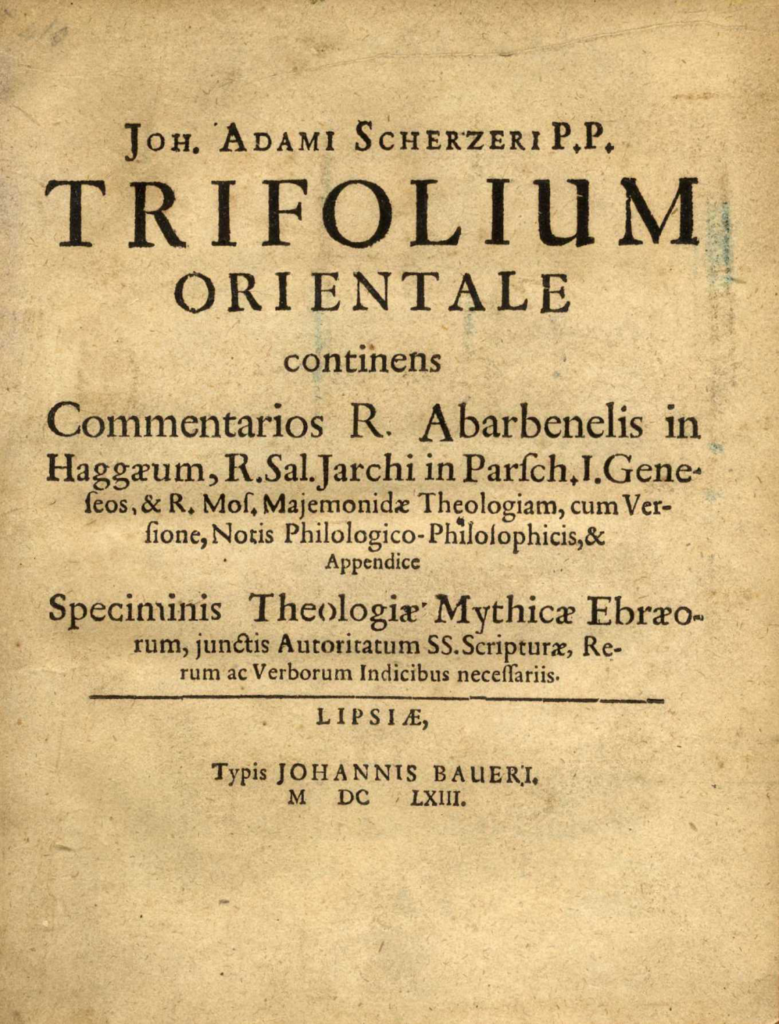
The author uses the Abarbanel in Prophets, Rash”i in Chumash Bereishit, and the Ramba”m in “Hilchot Yesodei HaTorah.”
Joh. Adami Scherzeri P.P. Trifolium Orientale continens Commentarios R. Abarbenelis in Haggæum, R. Sal. Jarchi in Parsch. I. Geneseos, & R. Mos. Majemonidæ Theologiam, cum Versione, Notis Philologico-Philolophicis, & Appendice Speciminis Theologiæ Mythicæ Ebræorum, junctis Autoritatum SS. Scripturæ, Rerum ac Verborum Indicibus necessariis
The author Johann Adam Schertzer was a German theologian, and a Lutheran cleric, teacher of the famed scientist and philosopher Gottfried Leibniz.
[8] 170 [14] pages, 19 cm. Fine-very fine condition, dismantled binding.
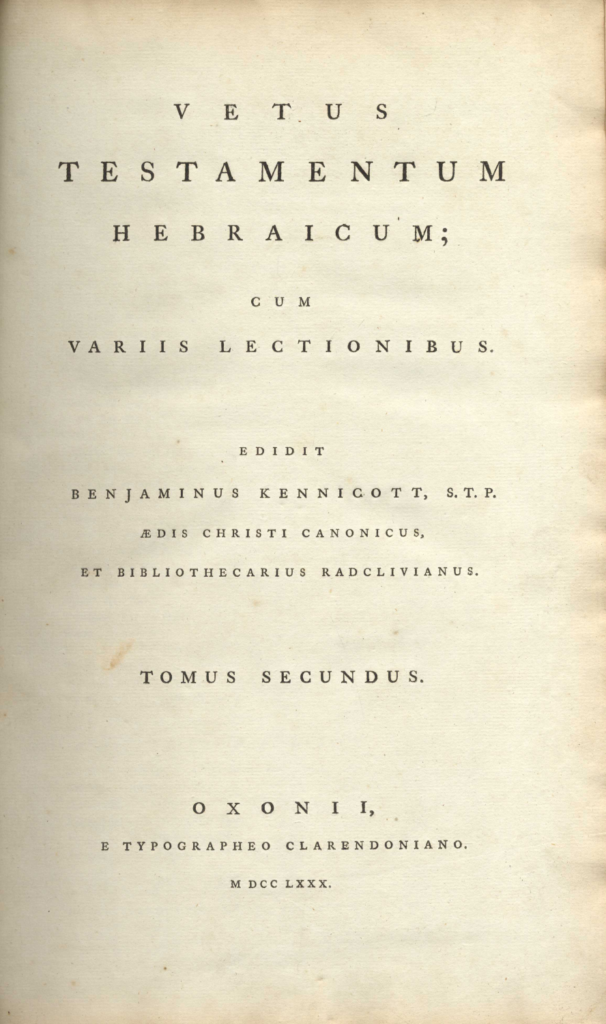
Tanach with various text variations. One of the first versions of the critical edition of the Bible arranged by Kennicott based on about 600 manuscripts and various prints from throughout Europe, includes text differences of the Samaritan edition, with comments in Latin . The Pentateuch was printed alongside the Samaritan version’s text variations. The editor’s work, Dissertatio Generalis, is printed at the end of the second volume.
Vetus Testamentum Hebraicum, cum variis lectionibus. Edidit Benjaminus Kennicott s.t.p . and Dissertatio generalis in Vetus Testamentum Hebraicum cum variis lectionibus .
Benjamin Kennicott was the chief librarian of the Radcliffe Library in Oxford and one of the foremost experts on Hebrew in England of his era. He spent most of his time comparing different manuscripts of the Bible. Kennicott and his colleagues throughout Europe worked on this edition, his magnum opus, for about 10 years.
Kennicott is also known for the famed eponymous Bible manuscript that he purchased for the Oxford library.
XXIII, [1 blank page], VIII, 684, [1] page. Volume two [4] 732; 129, [1 blank page], [6] pages, 42 cm.
Very fine condition. Original leather binding, professionally reinforced.